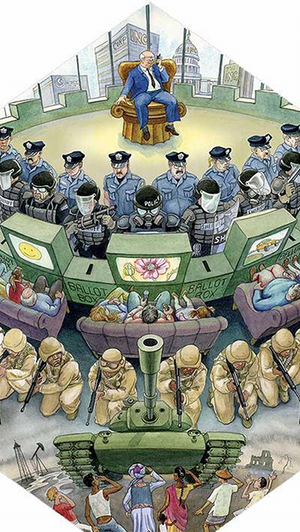Rhetoric:Capitalism is not democratic (WIP)
 | This page is argumentative. It is meant to convince the reader of a point that may not be universally endorsed by Leftypedia and its community. If you believe you can improve on the argument, feel free to edit it. If you want to argue against it, please start a new page within the "Rhetoric:" namespace. Click here to return to the Rhetoric homepage. |
"It is difficult for me to imagine what 'personal liberty' is enjoyed by an unemployed person, who goes about hungry and cannot find employment. Real liberty can exist only where exploitation has been abolished, where there is no oppression of some by others, where there is no unemployment and poverty, where a man is not haunted by the fear of being tomorrow deprived of work, of home and of bread."
How often have you heard the phrase "capitalism and democracy" used without any consideration before? Also, how often have you seen people causally associate democracy with capitalism (or as it's usually called by its apologists, the "free market") in more veiled ways? Propaganda like the so-called "economic freedom index" comes to mind, where the freedom to exploit your workers to the bone and hide away billions in off-shore bank accounts for tax evasion purposes is upheld just as much as the freedom to vote and run in elections (which, as I'll explain, is just as much a bourgeois pursuit under capitalism as the "economic freedom" nonsense is).
Capitalist apologists like to call their system democratic, as it fits very nicely with their petite-bourgeois convictions that capitalism is just a collection of rational (and hence to some extent equal) small business owners making decisions without any systemic problems, and therefore if you (read: 99% of the population) can't muster the funds to pay for extensive promotion and campaign efforts for a major election, it's your own fault, not the system's.
Meanwhile, socialist countries are slandered as "dictatorships" where the party holds total control of its famished and discontent population. Although the main reason why bourgeois media considers a country like the United States democratic ultimately boils down to "they allow voting," not actually caring about the infinite open or hidden anti-democratic measures in place to prevent it from being majoritarian, whenever it's a socialist country in question like the Democratic People's Republic of Korea, only then do systemic factors actually become meaningful again. Ergo, when you try and tell capitalist apologists that a country like the DPRK allows all the same democratic measures that the United States nominally does, you're met with a barrage of propaganda and conspiracies on how this democratic system is fraudulent because of x, y, and z propaganda.
At most, when a capitalist supporter (in this case a radical liberal, social democrat, etc.) admits their system has structural flaws which impede democracy, they will only admit they're flaws, not cancellations of democracy – flaws which can be "patched up" without eliminating capitalism. We can all agree that the DPRK has flaws, but liberals and other anti-communists apply an obvious double-standard whereby any system which isn't capitalism suddenly has to live up to their utopian expectations. But on the contrary, pointing out fundamental problems with bourgeois "democracy" and suggesting social revolution to rid ourselves of them is instantly called by them as "utopian."
What is democracy?
We all know what a democracy is — rule of many. Democracy is necessarily majoritarian; orientated towards the largest group of the population (or, by liberals' understanding, everybody!). But what I want you to do is logically consider what a democracy would look like. Most members of society would excise rule to a similar extent, and would be empowered to a considerable extent.
This doesn't mean that every member of society would be ruling in the sense that a head of state would, but rule in the sense that they as a collective have power to decide issues and the like, be it through representatives or other ways.
Now, using this definition, let's see if a capitalist country like the United States complies with it.
Are capitalist countries ruled by the majority?
Disclaimer
As this page currently stands, it is somewhat more focused on the United States of America as opposed to other countries. This is definitively a problem and there's certainly a lot more to the said about bourgeois democracy in both imperialist and non-imperialist countries (along with historical pre-monopoly capitalist states). Please suggest improvements or editions to this page on its talk page.

